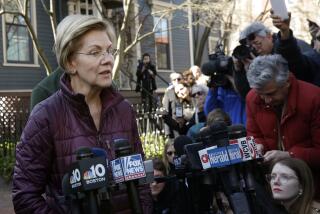Greenspan: Restrain Fannie and Freddie
- Share via
WASHINGTON — Mortgage giants Fannie Mae and Freddie Mac could pose a threat to the country’s financial system if their ability to take on new debt is not restrained, Federal Reserve Chairman Alan Greenspan said Tuesday.
Greenspan lent his influential voice to calls for reforms in the operations of the two government-chartered companies, which dominate the multitrillion-dollar mortgage industry.
Speaking to the Senate Banking Committee on Tuesday, Greenspan said he supported creation of a government regulatory agency to supervise the two corporations, saying the new regulator should have similar powers to federal banking regulators, including the authority to set minimum capital standards.
Fannie Mae and Freddie Mac, both Fortune 500 companies, have grown into two of the biggest financial companies in the world. They stand behind $4 trillion in home mortgages, or more than three-fourths of the single-family mortgages in the United States.
Greenspan stressed that this portfolio did not represent a risk currently to the financial system, but he warned that it could down the road if the explosive growth in debt held by the government-sponsored enterprises were not restrained.
Senate Banking Committee Chairman Richard C. Shelby (R-Ala.), told Greenspan that he was making creation of a regulator for the two institutions and the Federal Home Loan Bank System a top priority this year.
Shelby is supporting legislation to replace the current Office of Federal Housing Enterprise Oversight, which critics say lacks the power to properly regulate institutions of the size of Fannie and Freddie, with a new independent regulatory agency.
Fannie Mae and Freddie Mac have been under increased scrutiny since an accounting crisis at Freddie Mac came to light last spring. Freddie Mac acknowledged that it had understated earnings by $5 billion for 2000 through 2002. It later admitted inflating 2001 profit by nearly $1 billion.
In statements Tuesday, the two agencies took issue with Greenspan’s recommendations.
Fannie Mae Senior Vice President Jayne Shontell said the company appreciated that Greenspan had made it clear “that his concerns are not about some imminent problem” but about what course should be taken in the future. However, she said, “we, of course, disagree with most of his conclusions.”
Freddie Mac Chairman Dick Syron said that “the United States remains the only nation where a 30-year, prepayable mortgage is broadly available, and this is in large measure because of Freddie Mac and Fannie Mae.”
Greenspan said the problem facing Congress was that investors widely believe that if either Freddie or Fannie, as they are popularly known, got into financial trouble, the government would bail them out, even though the bonds issued by the corporations say they are not backed by the government.
This perceived guarantee, Greenspan said, allows the two corporations to raise money at lower interest rates than their financial competitors.
The two companies say their lower cost of funds is passed on to home buyers in the form of lower mortgage rates, but Greenspan pointed to a Fed study that this subsidy had lowered mortgage costs on average by a mere 0.07%, with most of the billions in savings going instead to the firms and shareholders.
More to Read
Sign up for Essential California
The most important California stories and recommendations in your inbox every morning.
You may occasionally receive promotional content from the Los Angeles Times.













